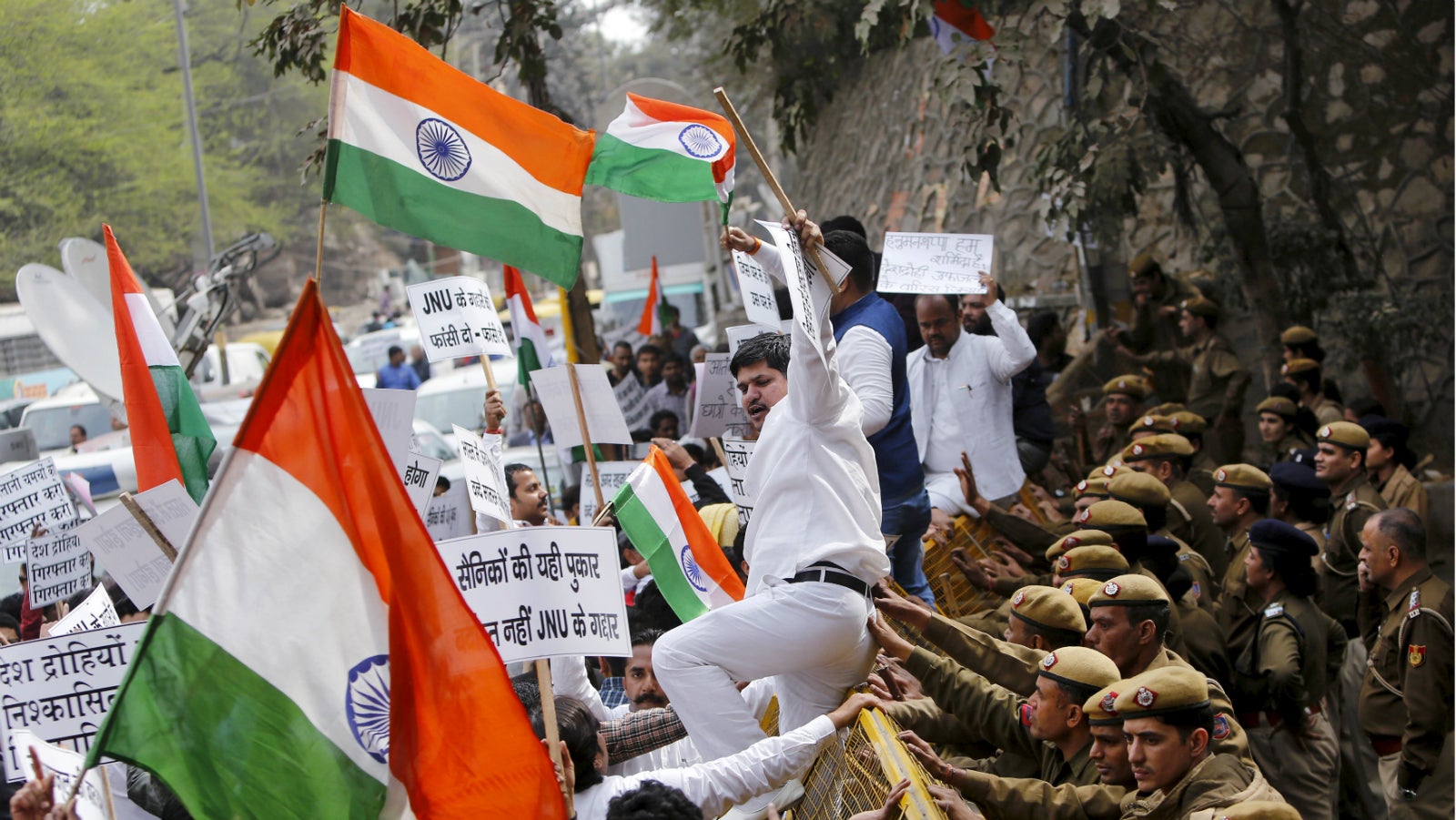In Modi’s India, there are only two sets of people: nationals and anti-nationals
“I wonder how much the ISI pays you for being their voice in India. As a country, we suffer more because bastards like you are around… you would never get till you suffer yourself…”


“I wonder how much the ISI pays you for being their voice in India. As a country, we suffer more because bastards like you are around… you would never get till you suffer yourself…”
This wasn’t from a troll. It was from a friend. When he eloped with his then girlfriend to Mumbai a few years ago, my home was where the new couple first arrived. Now, he is angry that my Facebook posts are critical of prime minister Narendra Modi and his government.
My friend is bewildered that anyone could be against a man who epitomises his brand of nationalism: rough, narrow, intimidating, and uncompromising.
For him, I am an “anti-national.”
Less than halfway through Modi’s five-year term, there has been a surge in hyper-nationalism in India that deems any critical view of the government—its ideology or its actions—”anti-national.” But not terribly long ago, “anti-nationals” were people who acted against the nation’s interest. Not those who expressed ideas, howsoever blasphemous, in college debates, tea-stall addas, or on social media.
The term has quickly become part of the lexicon that derides secularism and mocks liberalism. And, of course, you can either be a patriot—a righteous defender of the government in New Delhi—or an anti-national. There is nothing in between.
During the protests at New Delhi’s Jawaharlal Nehru University (JNU) last week, a section of the crowd evidently raised slogans against India, but that wasn’t exactly the same as acting against the nation. As political scientist Pratap Bhanu Mehta, writing in the Indian Express, explained:
Some of the students may have been deeply misguided in the beliefs they hold. But a university is the space to debate them: yes, even the hanging of Afzal Guru. But nothing they said amounts to a definition of illegality that should befit a liberal democracy.
Instead, the farcical, heavy-handed response by the authorities was more problematic, followed by the even more troubling media coverage and social media outrage that branded the entire university “anti-national.”
The repercussions of that hyperbole were clear at Delhi’s Patiala House courts on Monday (Feb. 15) where a mob of lawyers beat up JNU students as well as those suspected to be JNU students, besides journalists. A Bharatiya Janata Party (BJP) lawmaker at the court even justified the lynching of anyone who raised pro-Pakistan slogans. The police simply watched.
Never mind the nuances of debating free speech, for the defenders of patriotism to turn aggressive, one only needs to deviate a wee bit from the government’s line.
So, you don’t think Make in India will work? You think Modi is merely a showman? You think the GDP numbers are cooked up? You think Modi has gone back on most of his poll promises? You are an incorrigible anti-national.
The attempt is to make hyper-nationalism the new normal.
“It is because the term anti-national has certain resonance in today’s times that it is now being used in the derisive manner, as an abuse,” sociologist Dipankar Gupta, professor at Greater Noida-based Shiv Nadar University, explained.
“In a modern liberal democracy, nationalism or anti-nationalism should not matter,” he added, “It is citizenship that must matter. Citizenship involves certain legal rights that nobody can deny.”
But this is an abuse legitimised from the top of the BJP’s political structure. In the wake of the horrific Dadri lynching in September 2015, Haryana’s BJP chief minister Manohar Lal Khattar proposed that Muslims can live in India only if they give up beef.
Five months later, another BJP chief minister, Maharashtra’s Devendra Fadnavis, decided that all those who doubted David Headley’s testimony on Ishrat Jahan must be “anti-national.”
The whole idea, says Vikas Bajpai, assistant professor, Centre for Social Medicine at JNU, is this: “First they will appropriate the right to decide who is a national and who is anti-national, irrespective of what the law says. Then they will appropriate the right to punish.”
Exactly like the proceedings at the Patiala House courts.
We welcome your comments at [email protected].